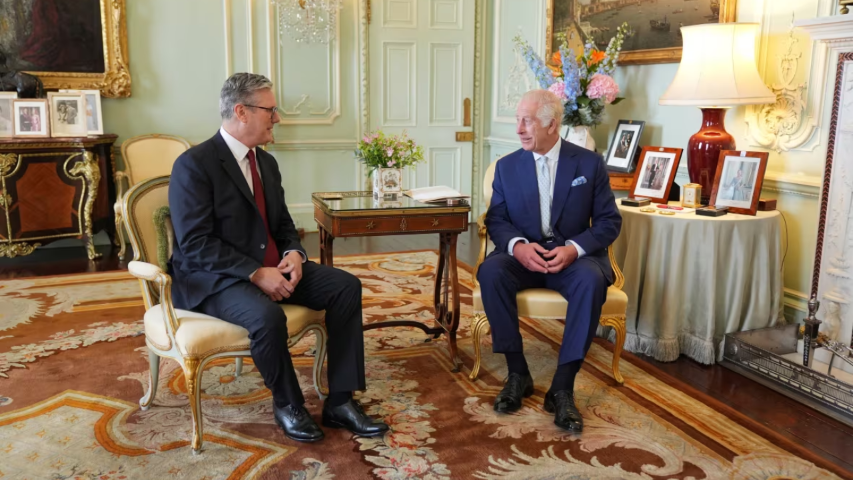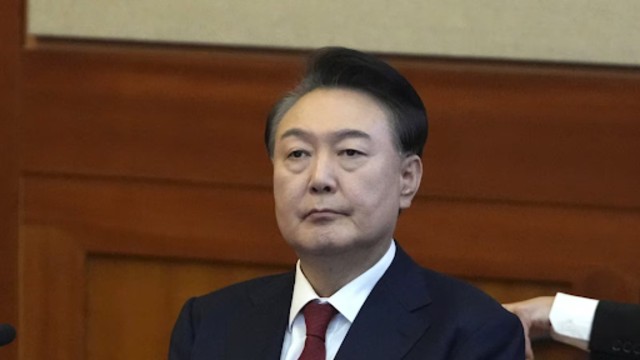
On Friday, King Charles formally granted Starmer permission to establish a government in a traditional ceremony called the 'kissing of hands.'
Keir Starmer has taken the reins as Britain's new Prime Minister following a resounding victory for the Labour Party after over a decade in opposition. In his inaugural address outside 10 Downing Street, Starmer acknowledged widespread disillusionment with politics but vowed to restore public trust and embark on a mission of national revitalization.
"Our government will inspire belief once more," Starmer proclaimed, amidst cheers from supporters. "The task of transformation starts now. We will reconstruct Britain, brick by brick, revitalizing opportunities for all."
In a highly choreographed political transition, Starmer assumed office shortly after Conservative Leader Rishi Sunak's departure from Downing Street, conceding defeat in a heartfelt resignation speech.
"This is a challenging day, but I depart honored to have served as Prime Minister of our exceptional nation," Sunak stated outside the official residence.
Sunak had earlier admitted defeat, accepting the electorate's "sobering verdict" in what became a historic electoral upset. In a somber farewell at the same venue where he had called for snap elections six weeks prior, Sunak acknowledged his errors.
"I've heard your frustrations, your dismay, and I take full accountability for this loss," Sunak conceded.
In a symbolic move, Starmer met with King Charles to formalize his appointment, marking a ceremonial shift of power known as the 'kissing of hands.'
Labour's sweeping victory, securing 412 seats in the 650-seat House of Commons, signals a dramatic political transformation. Starmer now faces the daunting challenge of meeting the electorate's demand for change amidst economic uncertainty, institutional distrust, and social discord.
"Not much has gone right in the past 14 years," remarked London voter James Erskine, hopeful for a seismic shift as polls closed. "I see this as a potential game-changer, and that's what I'm banking on."
Reflecting on the shift in political climate, Anand Menon, a professor of European politics, anticipates a return to stable governance after years of tumultuous politics resembling a theatrical farce.
"Expect a government with longevity, capable of planning beyond short-term goals," Menon predicted.
The incoming Parliament, reflecting a fractured and ideologically diverse electorate, highlights public discontent with the status quo. Smaller parties made significant gains, underscoring dissatisfaction with traditional politics.
Former Prime Minister Liz Truss's loss of her seat further underscored Conservative woes, compounded by economic turmoil and scandalous missteps.
Starmer swiftly began assembling his cabinet, appointing Rachel Reeves, a former Bank of England economist, as Treasury chief, the first woman to hold the position. Labour's Angela Rayner, known for her grassroots background, assumes the dual role of Deputy Prime Minister and Secretary for Levelling Up, Housing, and Communities.
Despite Labour's triumph, echoes of populist sentiment, embodied by Reform UK's Nigel Farage, persist, challenging traditional party lines.
The election outcome represents a catastrophe for the Conservatives, prompting leadership upheaval and soul-searching within the party.
In an era marked by economic strife, Brexit fallout, pandemic fallout, and political scandal, Starmer's cautious campaign approach resonated with voters, securing endorsements from business leaders and conservative media.
As Starmer assumes office amidst global congratulations, including from Canadian Prime Minister Justin Trudeau, the focus shifts to rebuilding Britain's economy, enhancing infrastructure, and fostering international partnerships for sustained growth.















